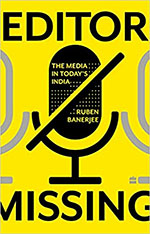The average viewer of television news or reader of newspapers is clueless about what really goes on within media organizations, how decisions are made on stories, what are the filters placed on the flow of information, or how news is shaped by shadowy players, whether they happen to be proprietors, advertisers, or governments. The value of this rather slight book lies in providing a chink that allows a little daylight to penetrate the dark innards of the Indian newsroom.
The use of the adjective ‘slight’ is for several reasons. It concerns only one media organization, Outlook, a weekly news magazine based in New Delhi; it is the first-person experiences of one particular journalist—the magazine’s editor-in-chief Ruben Banerjee—and it spotlights one particular development—a cover story that invited the opprobrium of the proprietors and ricocheted cruelly on Banerjee.
In fact, the opening lines of its Preface say it all: ‘I wish I didn’t have to write this book. At least not so soon.’ An unfortunate knot of circumstances and a sudden rush of free time after a notorious sacking forced this premature outcome. Yet, as alluded to earlier, it came at an opportune time when better understanding is needed of how a combination of state control and censorship added to the craven submission of media proprietors to government diktat, is hobbling the Indian media as never before.
Continue reading this review

